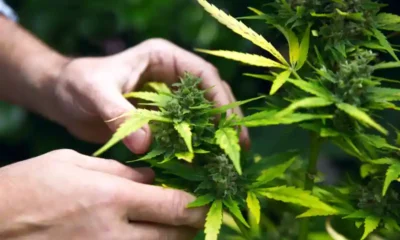Connect with us
Published
2 years agoon

While cannabis users with pets typically have their animal’s best interest at heart, it doesn’t take away the potential risk of animals ingesting products they shouldn’t. One new study published in the journal PLOS One looks at the prevalence and characteristic of cannabis-induced poisoning in pets, finding that more pets are being poisoned than in the past.
The study notes that the number of cannabis poisoning cases among pets jumped significantly in both Canada and the United State in 2018, after cannabis was federally legalized in Canada.
The researchers surveyed more than 200 veterinarians in Canada and the United States in 2021, finding a total of 283 reported cases of cannabis poisoning in pets. The survey of veterinarians found that these cases of cannabis-induced poisoning occurred most often in dogs, though other pets, like cats, iguanas, ferrets, horses, and cockatoos were not immune to the effects of accidentally consuming cannabis.
“I was expecting to see poisonings in cats and dogs, but the other animals, I wasn’t expecting,” lead study author Jibran Khokhar, an assistant professor in the Ontario Veterinary College at the university of Guelph in Ontario, Canada, told NBC News. He also said he was surprised by the number of animal deaths reported, “especially because we don’t know about any cannabis-related deaths in humans.”
According to the study, 16 animals reportedly died after consuming cannabis, though the veterinarians were unable to rule out other causes, like underlying conditions or other toxins inside edibles. Khokhar said he suspects that cannabis could play a part; other ingredients, like chocolate, which is toxic to dogs, may have had a larger impact.
Khokhar also told CNN that most of the cases of cannabis toxicity resulted from oral delivering, ingesting edibles, discarded joint butts or dried plant materials.
The good news? The study notes that most of the pet poisoning cases were benign. Though, Khokhar says, should a pet consume an edible, it’s best to take them to the vet for monitoring.
Khokhar said one reason for the rise in cases could also be due to the changing attitudes, and legislation, around cannabis.
“When the drug is legalized, more people are going to be willing to report,” Khokhar told CNN. “In the past they might have come in with the same issue and said, ‘I don’t know what happened to my pet.’”
Most people also said the exposure happened accidentally, though Khokhar said he didn’t believe they could rule out pet owners intentionally trying to give pets cannabis. While there are specific CBD products that are known to help pets, Khokhar said “everything else is hooey. Cannabis-based medicine is not approved for veterinary use.”
One of the main goals of the study was to qualify what cannabis-induced poisoning looks like in pets in order to work toward developing a drug to combat the effects. The most observed symptoms (primarily in dogs) were urinary incontinence, disorientation and abnormally slow heart rate. The best way to intervene is to keep the pet at the vet for monitoring over a one-to-two-day span. Khokhar said that window allows for intervention.
The next step for this research will look at modeling cannabis poisoning in rats to understand how the poisoning impacts the brain. From there, the team wants to use the findings to develop a drug that could counteract the effects and potentially eliminate the need to monitor pets after accidental cannabis consumption.
Dr. Dana Varble, the chief veterinary officer for the North American Veterinary Community, also weighed in with CNN and extended words of caution to pet owners:
“It’s important to remember our pets are not tiny people. They’re very different creatures with different metabolisms and because of that they can have serious outcomes from ingesting marijuana,” said Varble, who was not involved in the study. “The effects on a small animal will be much stronger than what you or I might experience. For a dog or cat that really doesn’t understand why they might feel a certain way, we certainly see disorientation, distress and anxiety.”
Varble also cautioned pet owners to remember that childproof containers aren’t dog-proof.
“Anyone who’s ever seen a dog chew up a plastic toy or a shoe can see how easily [accidental cannabis ingestion] can happen.”


Some NY Lawmakers Say Illicit Pot Shops Must Close Before Adding Licensed Shops


Minnesota Senate Approves Bill To Accelerate Licensing of Weed Businesses


Orangutan Observed Using Medicinal Herb To Heal Wound


Medical Cannabis Program on the Decline in New Jersey


Ho-Chunk Nation Decriminalizes Cannabis


Enemies of Weed Legalization Are Already Raising Money To Challenge Federal Rescheduling Effort
